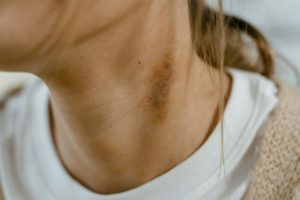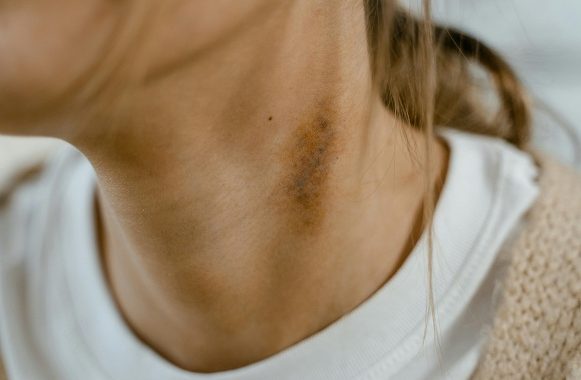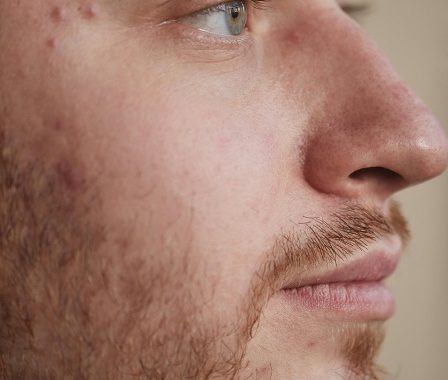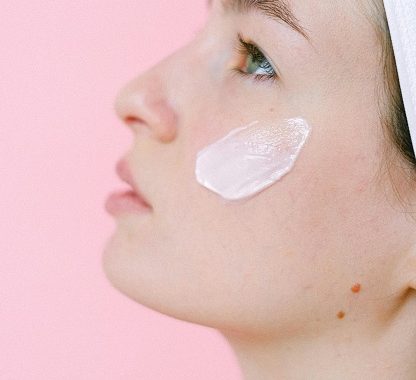
Hormonal acne can be a persistent and frustrating skin condition, often taking a toll on one’s self-esteem. Understanding the root causes and adopting effective strategies to combat hormonal acne is crucial for achieving clear and radiant skin.
In this article, we will explore how to clear up hormonal acne fast, treat it naturally at home, and address the underlying factors, including the role of hormones in acne development.
Identifying Hormonal Acne
Hormonal acne manifests as deep, painful lesions clustered along the jawline, chin, and neck. Its distinctive features include cyclical breakouts linked to menstrual cycles, the prevalence of cystic acne, and resistance to traditional acne remedies.
The timing correlation with hormonal fluctuations, the specific localization, and the unresponsiveness to standard treatments collectively serve as key indicators for identifying hormonal acne.
If you find your acne aligning with these characteristics, it is advisable to explore targeted strategies and consult with a dermatologist for tailored hormonal acne management.
Understanding the Role of Hormones
Hormonal acne in females is predominantly driven by androgen hormones, particularly testosterone. During key life stages like the menstrual cycle, pregnancy, or menopause, hormonal fluctuations can elevate androgen levels.
This surge prompts the sebaceous glands to overproduce oil, fostering an environment conducive to acne development. Excess oil, when coupled with dead skin cells, forms a perfect breeding ground for acne-causing bacteria.
Understanding this hormonal interplay is crucial in addressing the root cause of acne, guiding individuals toward targeted interventions that regulate androgen levels, thereby mitigating the impact on sebum production and preventing bacterial proliferation for clearer, healthier skin.
Best acne scar removal products
How to Clear Up Hormonal Acne Fast
- Maintain a Consistent Skincare Routine: Establish a gentle skincare routine using non-comedogenic products. Cleanse your face twice daily, and consider using a mild exfoliator to remove dead skin cells that can contribute to clogged pores.
- Natural Home Remedies:
- Tea Tree Oil: Known for its antimicrobial properties, tea tree oil can help reduce acne lesions. Dilute it with a carrier oil and apply it to affected areas.
- Honey and Cinnamon Mask: Create a mask using honey and cinnamon, both with antibacterial properties, to soothe and heal acne-prone skin.
- Hormonal Acne Diet:
- Balanced Diet: Opt for a diet rich in fruits, vegetables, and whole grains. Limit dairy, as it may contribute to hormonal imbalances. Omega-3 fatty acids found in fish can help reduce inflammation associated with acne.
- Stay Hydrated: Drinking an adequate amount of water helps flush toxins from your body, promoting clearer skin.
Best acne scar removal products
Best Hormonal Acne Treatment
Hormonal acne often requires targeted treatments, and among the most effective options are:
-
Topical Retinoids:
Prescription retinoids, such as tretinoin, are potent derivatives of vitamin A that play a pivotal role in regulating skin cell turnover.
By promoting the shedding of old skin cells and encouraging the growth of new ones, retinoids prevent the accumulation of dead cells that can clog pores. This process not only helps to reduce existing acne but also acts as a preventative measure against future breakouts.
It’s important to use these medications as directed by a dermatologist, as they can cause skin sensitivity and require gradual introduction to avoid irritation.
-
Oral Contraceptives:
Hormonal birth control, commonly prescribed for women, can be an effective treatment for hormonal acne. By stabilizing hormone levels, particularly reducing androgens, oral contraceptives help regulate the sebum production that contributes to acne development.
It’s crucial to consult with a healthcare professional to determine the most suitable contraceptive and dosage based on individual health considerations.
-
Anti-Androgen Medications:
Medications like spironolactone act as anti-androgens, specifically targeting the hormones responsible for triggering acne. By inhibiting androgen receptors, spironolactone reduces the production of sebum, helping to alleviate hormonal acne symptoms.
Typically prescribed for women, spironolactone can be an effective long-term solution when used under medical supervision. Regular monitoring is necessary to ensure hormonal balance and manage potential side effects.
Consulting with a dermatologist or healthcare provider is essential to tailor the treatment plan to individual needs and circumstances.
Best acne scar removal products
How to Tell If Acne Is Hormonal or Bacterial
Distinguishing between hormonal and bacterial acne is crucial for implementing targeted treatments. Hormonal acne primarily manifests on the lower face, jawline, and neck, areas rich in sebaceous glands sensitive to hormonal fluctuations.
This type of acne often coincides with menstrual cycles, pregnancy, or menopause, making its presence predictable in relation to hormonal changes. Hormonal acne is characterized by deep-seated cystic or nodular acne lesions, which can be painful and persistent.
On the other hand, bacterial acne can appear on various facial regions, lacking the specific pattern associated with hormonal acne. It commonly presents as whiteheads, blackheads, and pustules, reflecting the presence of acne-causing bacteria, typically Propionibacterium acnes.
Unlike hormonal acne, bacterial acne is not closely tied to hormonal fluctuations, making its occurrence less predictable in relation to menstrual cycles.
One key differentiator lies in the response to treatments. Bacterial acne tends to show improvement with topical antibacterial treatments, such as benzoyl peroxide or antibiotics, which target and eliminate the bacteria causing inflammation.
In contrast, hormonal acne may require a different approach, including oral contraceptives, anti-androgen medications, or topical retinoids that regulate hormonal fluctuations, reduce oil production, and prevent the formation of cystic lesions.
Understanding these distinctive features allows individuals to tailor their skincare routines and seek appropriate medical interventions.
If uncertainty persists, consulting with a dermatologist can provide valuable insights, leading to a more accurate diagnosis and effective treatment plan for either hormonal or bacterial acne.
Best acne scar removal products
Conclusion
Effectively managing hormonal acne involves a multi-faceted approach, incorporating proper skincare, a balanced diet, and targeted treatments. Identifying the specific triggers and adopting a personalized routine can help you achieve clearer skin and boost your confidence. Remember, consistency is key, and consulting with a dermatologist can provide tailored guidance for your unique skin concerns.
Further Reading:
Stubborn acne? Hormonal therapy may help
Hormonal Acne Diet: What to Eat to Improve Your Acne
Hormonal Acne Causes and Treatment
FAQs:
How I get rid of my hormonal acne?
To effectively get rid of hormonal acne, adopt a consistent skincare routine with non-comedogenic products, cleansing your face twice daily. Incorporate natural remedies like tea tree oil or honey-cinnamon masks. Adjust your diet by opting for a balanced, anti-inflammatory approach, limiting dairy and incorporating omega-3 fatty acids. Consider topical retinoids and hormonal treatments like oral contraceptives or anti-androgen medications under the guidance of a dermatologist. Stay hydrated and monitor hormonal fluctuations. A holistic approach, combining lifestyle changes with targeted treatments, can help alleviate hormonal acne and promote clearer skin.
�
Why am I getting so much hormonal acne?
Hormonal acne can arise due to an imbalance in androgen hormones, particularly testosterone. Factors such as menstruation, pregnancy, menopause, or certain medical conditions may trigger hormonal fluctuations. Increased androgen levels stimulate sebaceous glands, leading to excess oil production, clogged pores, and acne. Genetics, stress, and lifestyle factors like diet can also contribute. Consultation with a dermatologist can help identify the specific causes and develop a personalized treatment plan to manage hormonal acne effectively.
�
How can I prevent hormonal acne during my period?
To prevent hormonal acne during your period:
- Maintain a Consistent Skincare Routine: Follow a gentle cleansing routine using non-comedogenic products to keep your skin clean.
- Stay Hydrated: Drink plenty of water to help flush toxins from your body and maintain skin hydration.
- Balanced Diet: Opt for a diet rich in fruits, vegetables, and whole grains while limiting dairy to help regulate hormonal fluctuations.
- Regular Exercise: Engage in regular physical activity to promote blood circulation and reduce stress, which can impact hormonal balance.
- Consider Hormonal Birth Control: Consult with a healthcare professional about hormonal birth control options, which can help regulate hormone levels and prevent acne.
��
What do hormonal pimples look like?
Hormonal pimples are often characterized by their deep, cystic or nodular appearance. These lesions typically manifest as large, painful bumps beneath the skin’s surface. Hormonal acne tends to concentrate on the lower face, jawline, and neck, and it is associated with hormonal fluctuations during the menstrual cycle, pregnancy, or menopause. The pimples may not have a distinct head and can linger for an extended period. Unlike surface-level blemishes, hormonal pimples are rooted in the skin, making them more challenging to treat with conventional topical solutions. Seeking dermatological advice is crucial for effectively managing hormonal acne.




Pingback: Stubborn Acne? Hormonal Therapy May Help - Acnes derma relief